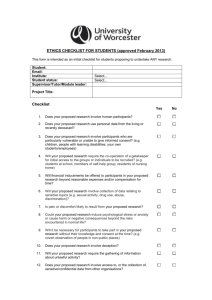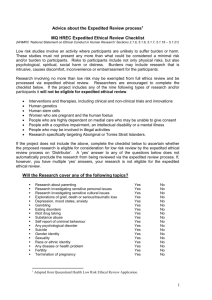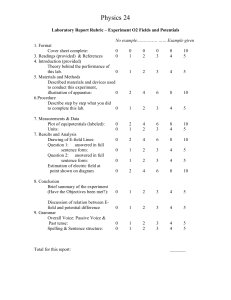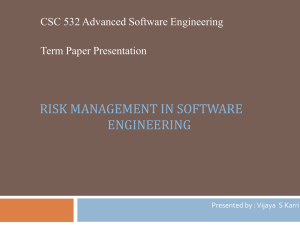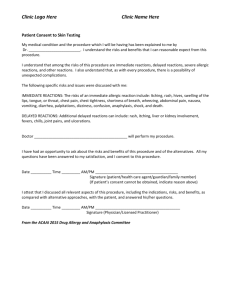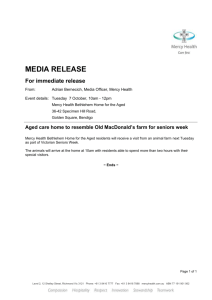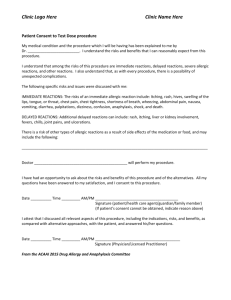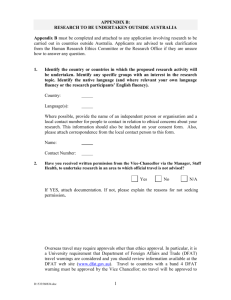Low Risk Checklist
advertisement
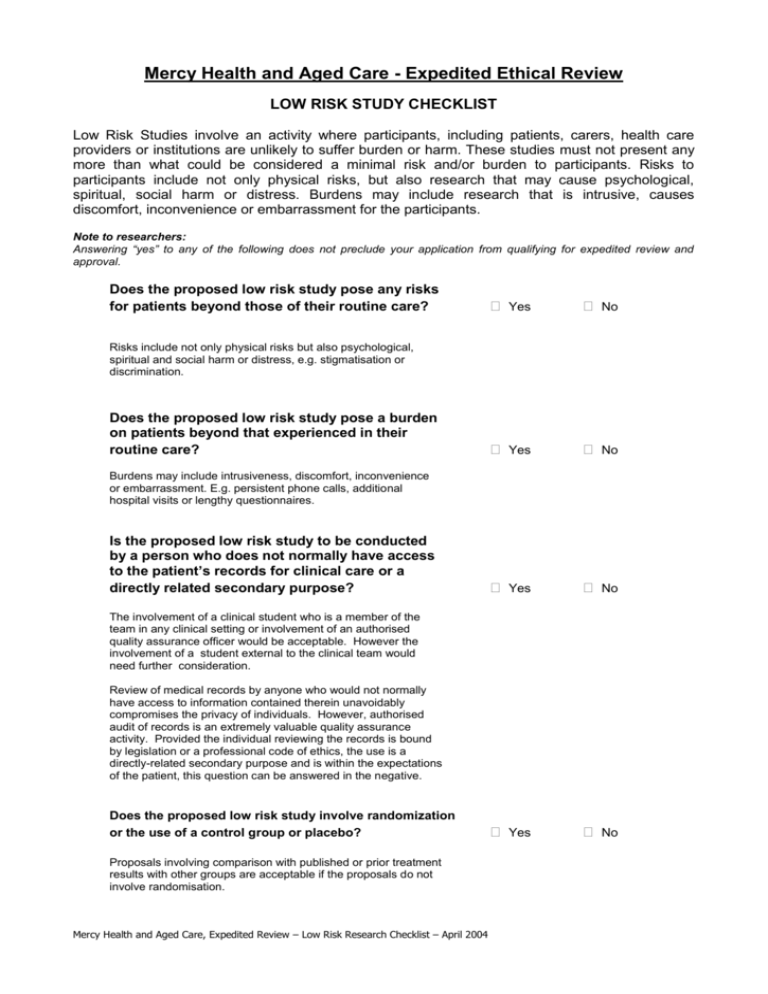
Mercy Health and Aged Care - Expedited Ethical Review LOW RISK STUDY CHECKLIST Low Risk Studies involve an activity where participants, including patients, carers, health care providers or institutions are unlikely to suffer burden or harm. These studies must not present any more than what could be considered a minimal risk and/or burden to participants. Risks to participants include not only physical risks, but also research that may cause psychological, spiritual, social harm or distress. Burdens may include research that is intrusive, causes discomfort, inconvenience or embarrassment for the participants. Note to researchers: Answering “yes” to any of the following does not preclude your application from qualifying for expedited review and approval. Does the proposed low risk study pose any risks for patients beyond those of their routine care? Yes No Yes No Yes No Yes No Risks include not only physical risks but also psychological, spiritual and social harm or distress, e.g. stigmatisation or discrimination. Does the proposed low risk study pose a burden on patients beyond that experienced in their routine care? Burdens may include intrusiveness, discomfort, inconvenience or embarrassment. E.g. persistent phone calls, additional hospital visits or lengthy questionnaires. Is the proposed low risk study to be conducted by a person who does not normally have access to the patient’s records for clinical care or a directly related secondary purpose? The involvement of a clinical student who is a member of the team in any clinical setting or involvement of an authorised quality assurance officer would be acceptable. However the involvement of a student external to the clinical team would need further consideration. Review of medical records by anyone who would not normally have access to information contained therein unavoidably compromises the privacy of individuals. However, authorised audit of records is an extremely valuable quality assurance activity. Provided the individual reviewing the records is bound by legislation or a professional code of ethics, the use is a directly-related secondary purpose and is within the expectations of the patient, this question can be answered in the negative. Does the proposed low risk study involve randomization or the use of a control group or placebo? Proposals involving comparison with published or prior treatment results with other groups are acceptable if the proposals do not involve randomisation. Mercy Health and Aged Care, Expedited Review – Low Risk Research Checklist – April 2004 If you answered YES to any of the above, please give further details: Is the research specifically about any of the following topics? research about parenting research investigating sensitive personal issues research investigating sensitive cultural issues explorations of grief, death or serious/traumatic loss depression, mood states, anxiety gambling eating disorders illicit drug taking substance abuse self report of criminal behaviour any psychological disorder suicide gender identity sexuality race or ethnic identity any disease or health problem fertility termination of pregnancy Yes Yes Yes Yes Yes Yes Yes Yes Yes Yes Yes Yes Yes Yes Yes Yes Yes Yes No No No No No No No No No No No No No No No No No No If you answered YES to any of the above, please give further details: Are any of the following procedures to be employed? use of personal data obtained from Commonwealth or State Government Department/Agency deception of participants concealing the purposes of the research covert observation audio or visual recording with consent recruitment via a third party or agency withholding from one group specific treatments or methods of learning, from which they may “benefit” (eg in medicine or teaching) any psychological interventions or treatments administration of physical stimulation invasive physical procedures infliction of pain administration of drugs administration of other substances administration of ionizing radiation tissue sampling or blood taking collecting body fluid genetic testing use of medical records where participants can be identified or linked drug trials and other clinical trials Mercy Health and Aged Care, Expedited Review – Low Risk Research Checklist – April 2004 Yes No Yes Yes Yes Yes Yes Yes No No No No No No Yes Yes Yes Yes Yes Yes Yes Yes Yes Yes Yes No No No No No No No No No No No Yes No administration of drugs or placebos Yes No If you answered YES to any of the above, please give further details: Other Risks Are there any risks to the researcher, (e.g. research undertaken in unsafe environments or trouble spots)? Yes No If you answered YES, please give further details: Participants – Vulnerability Assessment Does the research target any of the following categories of people? suffering a psychological disorder suffering a physical vulnerability people highly dependent on medical care minors without parental or guardian consent people whose ability to give consent is impaired resident of a custodial institution unable to give free informed consent because of difficulties in understanding information statement (eg language difficulties) members of a socially identifiable group with special cultural or religious needs or political vulnerabilities those in dependent relationship with the researchers (eg lecturer/student, doctor/patient, teacher/pupil, professional/client) participants be able to be identified in any final report when specific consent for this has not been given indigenous Yes Yes Yes Yes Yes Yes Yes No No No No No No No Yes No Yes No Yes No Yes No If you answered YES to any of the above, please give further details: Research In Overseas Settings Does the research involve any of the following: research being undertaken in a politically unstable area research involving sensitive cultural issues research in countries where criticism of government and institutions might put participants and/or researchers at risk Yes Yes Yes No No No If you answered YES to any of the above, please give further details: Mercy Health and Aged Care, Expedited Review – Low Risk Research Checklist – April 2004
